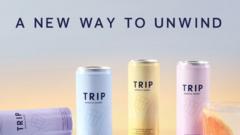Why Was the Trip Drink Ad Banned for Promising Calm?

Understanding the Controversy Surrounding Trip Drinks’ Advertising Claims
In recent months, the non-alcoholic beverage industry has seen a significant surge in popularity, with brands like Trip Drinks emerging as key players. However, the company has found itself in hot water due to a banned advertisement that made unauthorized health claims. The Advertising Standards Authority (ASA) upheld complaints against Trip Drinks, ruling that the ad misled consumers regarding the supposed benefits of its products. This article delves into the implications of the ASA’s decision, the regulatory environment for health claims in food and drink marketing, and the evolving landscape of non-alcoholic beverages.
What Happened with Trip Drinks?
In December 2023, Trip Drinks launched an advertisement for its cucumber and mint-flavored beverage, promoting it as a drink that could “help you feel calm.” The ad also suggested that it could reduce stress and anxiety, claims that prompted an investigation by the ASA.
Upon review, the ASA found that Trip made several unauthorized claims about its products, which included ingredients marketed as having calming properties. Specifically, the drink featured ingredients such as:
- Cucumber
- Mint
- Magnesium
- Lion's Mane extract
- L-theanine
- Ashwagandha
The ASA determined that the claims about these ingredients helping to reduce anxiety were not aligned with the rules set forth in the Great Britain nutrition and health claims register. Furthermore, the ad’s language—phrases such as “crafted for calm”—led consumers to believe that the drink could have therapeutic benefits, which is prohibited by current advertising standards.
Why Are Health Claims Regulated?
The regulation of health claims in food and drink advertising is crucial for protecting consumer interests. The GB nutrition and health claims register stipulates which claims can be made regarding food and supplements. This regulation is in place to ensure that consumers are not misled about the products they consume. Misleading claims can lead to false expectations about a product’s effectiveness, which in turn can impact consumer choices and health outcomes.
The Implications of the ASA's Ruling
Following the ASA's ruling, Trip Drinks was instructed to remove the misleading advertisement and refrain from making claims that their drinks could prevent, treat, or cure any human disease. This decision highlights the importance of adhering to established advertising codes, particularly for companies operating in the health and wellness sector.
Moreover, Trip’s claim of “0g added sugar” was deemed inaccurate, further complicating the brand’s credibility. This aspect of the ruling underscores the necessity for transparency in marketing practices. Misrepresentations can not only lead to legal penalties but can also erode consumer trust, which is vital for brand loyalty.
The Rise of Non-Alcoholic Beverages
The market for non-alcoholic drinks has been burgeoning in recent years, driven by a growing consumer shift towards healthier lifestyles and mindfulness. Brands like Trip Drinks are tapping into this trend by offering beverages that are positioned as relaxing and stress-relieving alternatives to traditional alcoholic drinks.
Key reasons for the rise in popularity of non-alcoholic beverages include:
- Health Consciousness: Consumers are increasingly aware of the health implications of alcohol consumption and are seeking alternatives.
- Mindfulness and Wellness Trends: Many individuals are prioritizing mental well-being and are interested in products that promote relaxation.
- Social Acceptance: There is a growing acceptance of non-alcoholic options in social settings, making them more appealing to a wider audience.
Understanding CBD and Its Role in Beverage Marketing
Trip Drinks has positioned itself as the “UK's No.1 CBD brand.” Cannabidiol (CBD) is a compound derived from the cannabis plant, often marketed for its purported calming and anxiety-reducing effects. Unlike THC, the psychoactive component of cannabis, CBD does not induce a "high." This distinction makes CBD an attractive ingredient for health-focused products.
However, the marketing of CBD products is also subject to regulatory scrutiny. Brands must ensure that any health claims associated with CBD are substantiated and compliant with advertising regulations. The ASA’s ruling against Trip Drinks serves as a reminder that even widely accepted ingredients can be subject to strict advertising guidelines.
Future Prospects for Trip Drinks
In response to the ASA's ruling, Trip Drinks indicated that it would remove the contested claims while seeking external advice. The company expressed hope that it would eventually be able to make health claims in the future, provided they comply with regulatory standards.
This situation presents an opportunity for Trip Drinks to refine its marketing strategy. By focusing on accurate, substantiated claims, the brand can build consumer trust and align with regulatory frameworks. Additionally, it can leverage consumer interest in health and wellness without misleading its audience.
Best Practices for Marketing Non-Alcoholic Beverages
For brands operating in the non-alcoholic beverage space, adhering to best practices in marketing is crucial. Some key considerations include:
- Substantiate Claims: Ensure that all health claims are backed by scientific evidence and comply with regulatory standards.
- Transparency: Be clear about product ingredients and any potential health benefits, avoiding vague language that could mislead consumers.
- Engage with Consumers: Foster open communication with your audience, addressing concerns and educating them about your products.
- Stay Informed: Keep up to date with the latest regulations and trends in the beverage industry to ensure compliance and relevance.
Conclusion
The recent ruling against Trip Drinks underscores the importance of responsible marketing in the non-alcoholic beverage industry. As consumers become more health-conscious and seek out products that align with their wellness goals, brands must navigate the complex landscape of advertising regulations. By prioritizing transparency and substantiated claims, companies can cultivate trust and loyalty among their target audience.
As the market for non-alcoholic beverages continues to grow, how do you think brands can effectively balance consumer demand for health benefits with regulatory compliance? Should companies take a more cautious approach in their marketing strategies?
FAQs
What health claims can be made about food and drink products?
Health claims must be substantiated by scientific evidence and comply with regulations set forth by the Great Britain nutrition and health claims register. Claims that imply a product can prevent, treat, or cure disease are generally prohibited.
What ingredients are often associated with calming effects in beverages?
Common ingredients include CBD, L-theanine, ashwagandha, and magnesium. However, claims regarding these ingredients must be properly validated to ensure compliance with advertising standards.
How can a brand rebuild its reputation after a regulatory ruling?
A brand can rebuild its reputation by prioritizing transparency, ensuring accuracy in advertising, engaging with consumers, and focusing on substantiated claims that align with regulatory standards.
In the evolving landscape of non-alcoholic beverages, how will brands adapt their strategies to both meet consumer expectations and navigate regulatory frameworks? #NonAlcoholicBeverages #HealthClaims #CBDMarketing
Published: 2025-07-15 23:04:05 | Category: technology



